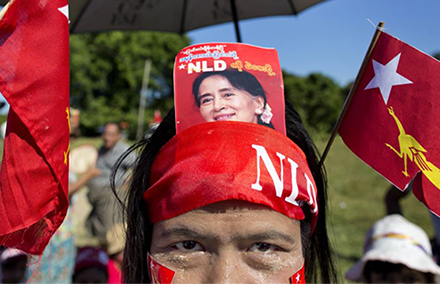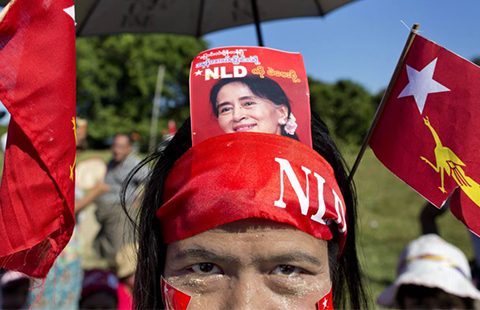
An NLD supporter at a rally in Myanmar’s Rakhine State.
The 2015 elections and consequences for Myanmar’s ethnic parties.
Myanmar’s election results have been cause for much hope and celebration as the political map has been decisively redrawn and an exciting new chapter opens in the country’s history.
But the National League for Democracy landslide, described as ‘a red wave’, has also been referred to as ‘a tsunami’, reshaping the political landscape and all but wiping many ethnic political parties from the map.
As the dust settles on the final count, it’s worth taking stock of the new terrain; one where ethnic party political representation is much depleted despite the country’s ethnic and religious diversity.
Sea change: ethnic parties then and now
Ethnic party political engagement has been steadily climbing since 1990, when roughly half of the 99 parties that contested those flawed elections were ethnic, including 18 of the 27 which went on to win seats.
In 2010, when the NLD chose to boycott elections, ethnic parties emerged as the first legitimate opposition to the ruling military-backed Union Solidarity and Development Party. Of the 37 parties that contested the elections, 23 were ethnic. Ideally placed to represent communities from which they emerged, they received ready and popular support. Sixteen of the 21 parties that won seats were ethnic-based, together claiming 180 seats across state and union assemblies.
For the first time in over four decades many ethnic nationalities had a formal political voice. Despite being dwarfed by USDP gains and Tatmadaw allocations, they offered diverse representation and vibrant opposition across the country’s legislature as they started to shape their own political visions within a federal Union of Myanmar.
Today, many of these nascent political visions have seemingly halted in their tracks. Whilst 18 of the 59 ethnic political parties that contested the 8 November elections did win seats, they gained just 139 altogether – or 12 per cent of elected seats, most of which are in the hands of two parties.
The Arakan National Party claimed 45 of the 139 seats won by ethnic parties, and came close to gaining majority control of the Rakhine State hluttaw. It appealed strongly to the majority ethnic Rakhine Buddhists in a region where ethnic politics is sharply informed by ongoing religious tensions. The Shan Nationalities League for Democracy, in the north of the country, gained 40 seats, finding the kind of form it did back in 1990. Both these parties are hardened campaigners, well organised and resourced.
In some cases ethnic party representation has been almost eviscerated. Of nearly 300 Karen candidates and six Karen parties just one candidate from the Karen Peoples Party was elected in Thandaunggyi to the Karen State hluttaw. Party prospects for some minority ethnic groups elsewhere, such as the Lhaovo and Shan-ni, were strangled at birth.
Influential ethnic political alliances that have emerged over the last five years such as the United Nationalities Brotherhood, which has been particularly outspoken on constitutional reform and directly involved in the peace process, now have a much-reduced parliamentary profile.
An elite Bamar-led party is left dominating Myanmar’s multi-ethnic polity; but this time with a national mandate to do so.
The 2015 election: the red wave and other currents
National interests have doubtless largely trumped ethnic ties, particularly in an election conditioned by big party politics. The prospect of the USDP’s transformational reform agenda and the potential fulfilment of the NLD’s historic struggle has largely framed the choice at the ballot box. Ethnic parties have been incapable of appealing to voters in anything like these terms.
Nor have they been able to mobilise on anything approaching the same scale. The 60-day campaign window set by the Union Election Commission posed particular challenges to smaller ethnic parties, with limited resources, often campaigning in remote regions. Many of the ethnic parties I spoke to during the campaign window had little or no funding; some did not have the most basic administrative support, let alone campaign management.
At the same time, the NLD’s decision to deploy ethnic candidates in most ethnic areas has done much to usurp the ethnic political position. The presence of prominent and respected members of ethnic communities under the NLD banner appears to have further persuaded ethnic communities that their investment in such a vote no longer calls into question their ethnic allegiances.
Such is the confidence in the NLD’s potential to safeguard ethnic interests that 21 of the 29 new Ethnic Affairs Ministers, elected to represent ethnic minority populations across states and regions, are drawn from the party’s ranks.
However, it remains unclear to what extent the NLD can realistically represent and respond to the huge diversity of ethnic interests and aspirations across the country. Many fear that ethnic voices within the party will be easily ignored, its centralised style of decision-making making this only too likely.
Furthermore, the leadership’s refusal to be drawn into debates on ethnic conflict and religious violence in parts of the country raises further concerns that such issues affecting ethnic communities will not be prioritised by the NLD.
Adrift but afloat: ethnic parties in the future
As many ethnic politicians prepare to leave their posts and return to their communities and a new political order asserts itself without many of them, it is important to remember the definite contribution they have made to the country’s political development, democratic transition and peace process over the past five years.
They have worked hard to safeguard the cultural integrity of their people. In many ways, they have acted as a necessary bulwark against Burmanisation, particularly for ethnic minority populations. At the same time, the many smaller parties, which have now largely disappeared, worked to represent smaller or isolated ethnic groups in danger of being marginalised by larger ones.
The work of ethnic parties and politicians in state hluttaws has done much to influence policy-making and amendment. They have, for example, worked hard to promote the use of ethnic languages in education and represent local needs in natural resource management. The contribution such efforts have made to wider processes of decentralisation is of still more value.
Ethnic parties have played a particularly important role in promoting peace and equality especially for more remote and impoverished parts of the country. Many ethnic parties and well-known local politicians have played an active role in supporting the national peace process, representing the needs of conflict-affected communities, working closely with other civil society organisations on peace-building initiatives and at times even mediating between armed groups and the government.
Despite existing on the margins now, many of Myanmar’s ethnic political parties still have a crucial role to play in shaping its emerging political culture. Their proximity to the country’s many ethnic communities and the support they enjoy among them cannot be ignored. Their experience in representing ethnic rights and interests will be invaluable to the success of wider peace and reform processes in many parts of the country.
Beneath the red wave, the currents of Myanmar’s ethnic politics are likely to shift and change over the coming years. The tsunami that removed or reduced many ethnic political parties may now present a valuable opportunity to reflect on differences and consolidate interests.
It is also an opportunity to develop the capacity of this essential third pillar in the country’s political matrix so it can continue to play a decisive role in the future.
Richard Dolan is a DPhil Candidate at the Department of International Development, Queen Elizabeth House, University of Oxford currently carrying out fieldwork in southeast Myanmar.
This article forms part of New Mandala’s ‘Myanmar and the vote‘ series.
 Facebook
Facebook  Twitter
Twitter  Soundcloud
Soundcloud  Youtube
Youtube  Rss
Rss 